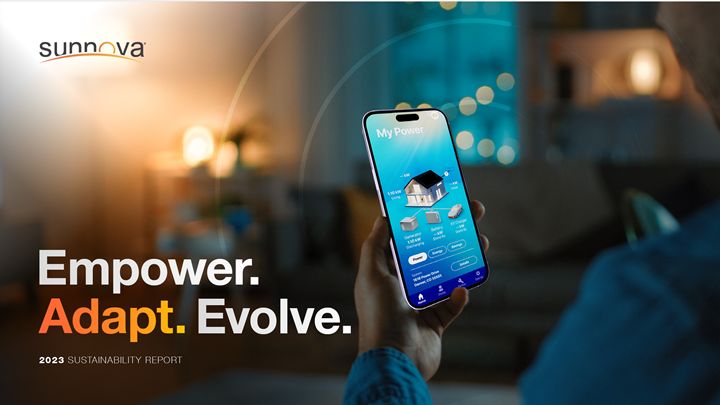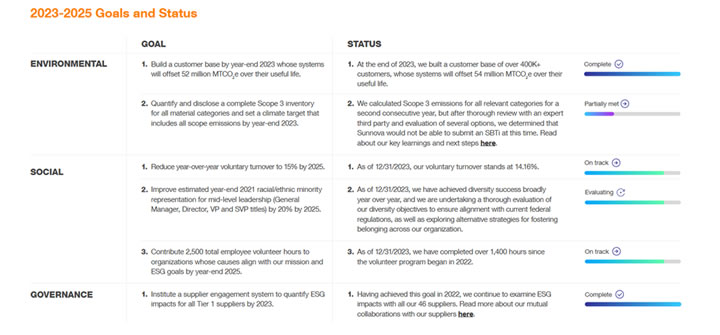We recognize the potential for growth, innovation, and development in the shift towards a low-carbon economy, and our position allows us to leverage these opportunities for the benefit of our customers and the planet.
 Corporate Sustainability Strategy within the Renewable Energy Industry
Corporate Sustainability Strategy within the Renewable Energy Industry

Q&A with Leigh Anne Bishop, Director of Sustainability | Sunnova
Please tell us about yourself and your role with Sunnova.
As the Director of Sustainability at Sunnova, I help to foster a culture of sustainability throughout the company. I have overseen the production of our last three sustainability reports (2021, 2022, 2023), which have been critical to highlighting our commitment to transparency in our sustainability initiatives. My role involves coordinating and aligning sustainability communications and projects within Sunnova, culminating in the public disclosure of sustainability data and materials in the annual Sustainability Report.
What does sustainability mean to you and to Sunnova?
Sustainability is one of our three core values (synergy, service, and sustainability), so you could say sustainability is baked into our DNA here at Sunnova. We believe in doing well by doing good. We are determined to provide the world with clean, reliable, and affordable energy by focusing on responsible growth, resiliency, and innovation to create lasting value for all our stakeholders (customers, employees, and investors included). We want to be here for the long haul through the energy transition and beyond.
How have you evolved Sunnova’s sustainability program since becoming the Director of Sustainability?
This publication marks Sunnova's fourth consecutive annual sustainability report released to the public. As the company grew, our sustainability strategy grew to include a formal materiality process and an expanded alignment with best-in-class frameworks in the ESG space.
Our strategy and reporting are informed through the lens of materiality, as defined in a sustainability context. We consider a topic to be material based on stakeholder engagement to determine whether a corporate sustainability topic is of high importance to our stakeholders and high importance to our business. As part of our proactive sustainability strategy, our second formal materiality assessment will be conducted in the fall of 2024.
For the past two years, our report was prepared in alignment with the:
Global Reporting Initiative (GRI) – core reporting standard.
International Financial Reporting Standards Foundation’s (IFRS) Sustainability Accounting Standards Board (SASB) Solar Technology & Project Developers and Renewable Resources Fuel Cells and Industrial Batteries framework metrics. While these are the closest SASB industry standards to our business, note that Sunnova manages solar energy systems and offers financing and maintenance services to customers. We do not manufacture solar energy or battery equipment.
IFRS’ Task Force on Climate-related Financial Disclosures (TCFD) – we align our climate change reporting with the TCFD framework and we conducted a full TCFD-aligned climate scenario analysis in our 2022 report. The 2023 report marks the second consecutive year that we have calculated a complete Scope 3 emissions inventory.
Lastly, our sustainability strategy is also informed by the United Nations’ Sustainable Development Goals (SDGs).

Sunnova Earth Day Event
Can you provide an overview of Sunnova’s sustainability strategy and describe how it balances environmental responsibility, affordability, and resilience in its energy services?
Sunnova is dedicated to Powering Energy Independence™ while promoting environmental sustainability. We recognize the potential for growth, innovation, and development in the shift towards a low-carbon economy, and our position allows us to leverage these opportunities for the benefit of our customers and the planet. To date, our customers’ systems have offset millions of carbon emissions, and continue to contribute to a cleaner future.
In terms of social responsibility, we continue to invest our money and our time by collaborating with local, national, and global organizations on issues that speak to the heart of our corporate mission, including economic development, equitable energy access, and community resilience. The three pillars of our corporate social responsibility (CSR) platform are integrated with our values: Sustainability (environment, conservation, and stewardship), Synergy (education and civic needs), and Service (health and human services).
Our energy services are comprised of three interconnected categories (financing, service and management) to manage assets and optimize clean, affordable, and reliable power for our network of customers. This three-part service arrangement enables us to supply tailored solutions, provide ongoing system services, and guarantee energy management support throughout the customer’s journey with us. We are not simply an energy services company – we are a trusted partner committed to helping our customers achieve their energy goals.
What specific sustainability goals did Sunnova achieve in 2023?
Sunnova’s current sustainability goals are below. Additionally, you can see the 2023 highlights listed below. This information and more can be found in Sunnova’s 2023 Sustainability Report.

2023 Highlights Include:
The Business
Renewable Energy
• 1,090 megawatt hours of energy storage under management • 2.5 gigawatts of solar power generation under management
• 8.1 billion kilowatt hours of projected generation of clean energy over the lifetime of systems (cumulative)
Clean Energy Access and Grid Stability
• Closed $3B partial loan guarantee with the U.S. Department of Energy (DOE), representing DOE’s first loan guarantee for virtual power plants
• Launched the Sunnova Power Flex Program in collaboration with LUMA's Customer Battery Energy Sharing (CBES) initiative in Puerto Rico
• Selected by the DOE’s Grid Deployment Office to receive part of a $440 million commitment to install rooftop solar and batteries in vulnerable single-family households across the island through the Puerto Rico Energy Resilience Fund (PR-ERF)
Customer Service
• Established 12 Regional Operating Command Centers (ROCCs) within our expanded Global Command Center (GCC)
• Implemented a dedicated Critical Command ROCC and Technical Support Customer Care Team to optimize response times and achieve swift resolution for critical customer cases
• Expanded our Incident Management and Severe Weather Assessment Teams to handle pre-, during and post- weather events needs for our customers and business operations
Customer, Workforce & Dealer Growth
• Customer Growth: 419K+— 115% growth year-over-year
• Workforce Growth: 2K employees—75% growth year-over-year
• Dealer Growth: 900+ dealers new sub-dealers, and new homes installers in 2023
Supplier Standards & Engagement
Enhanced transparency around business designation, and ESG compliance within our supply chain.
The Community (Beyond Business)
• Logged over 1,200 community service hours in 2023 alone, now over 1,400+ in total (our initial goal is 2,500 by 2025)
• Donated mission-critical materials and solar and storage systems via Empowered by Light
to Maui Fire Relief efforts in Hawaii and Portal de Amor orphanage in Puerto Rico
• Collaborated with Seeding Mercy to fund off-grid solar-powered irrigation pumps, combating hunger and empowering communities in east Africa
ESG Ratings and 2023 Awards
Sunnova continues to lead publicly available peer ESG ratings.
• Sustainalytics | 15.3 Low Risk rating from Morningstar Sustainalytics
• MSCI ESG Rating | Maintained MSCI AA rating in 2023
• ISS ESG Corporate Rating | Maintained ISS ESG Prime Status
Awards
• Comparably Best CEO 2023
• IFR International Finance Review Structured
Finance Award
• Green Builder Media 2023 Eco-Leader
• Green Home Builder Survey Winner
• Top Solar Companies Platinum Award
• Ally Energy Best Energy Workplace
What steps is Sunnova taking to ensure transparency and accountability in its sustainability efforts?
We seek to scale energy services to help our customers power their independence in ways that are environmentally responsible, socially equitable, economically affordable, and resilient. Simultaneously, we embed responsible business practices and risk mitigation into our operations to ensure the long-term sustainability of our business. This includes sustainability risk management overseen by our senior leadership and Board of Directors and monitored and enhanced by our Sustainability Steering Committee. We also continue to evaluate integration of third-party assurance in our sustainability reporting to demonstrate our commitment to transparency.
Give your pitch on why other renewable energy companies should model their sustainability strategy after Sunnova.
One size does not fit all when it comes to sustainability, but it helps to have a clear purpose. Our mission at Sunnova is to make clean energy more accessible, reliable, and affordable for homeowners and businesses. In the energy transition, every company, regardless of industry, can contribute to a better world by beginning their sustainability journey with a clear purpose and honest self-assessment:
- What is our purpose?
- What stakeholders are crucial to our mission and what topics are material to our business?
- How can we achieve our business goals in a responsible, sustainable manner?
- How can we help mitigate risks brought by climate change?
- By what metrics will we measure our progress?
- And how can we continue to improve?
Finding these answers can be challenging, but if you have a great team and a company that is dedicated to sustainability and doing the right thing, then I find that collaboration makes every day exciting, worthwhile, and impactful.
How will you position Sunnova as a leader in sustainability for the solar/renewable energy industry?
To paraphrase the title of our latest report, Sunnova is always adapting and evolving. As we make progress on our 2025 sustainability goals we set three years ago, many are still relevant, while some lack the nuanced context of the company we are today. This indicates the need to reassess our materiality aligned with leading practices, including engagement across our many stakeholder groups. We’ve had productive conversations and have welcomed new perspectives to discover what is meaningful, measurable, and actionable toward our sustainability ambitions. Through our next materiality assessment process, kicking off later this year, we intend to test these findings through engagement and, as needed, we will reframe our strategy with fresh perspectives that align with our adaptable business.
Moreover, with new regulations in key markets, our team is focused on delivering reporting that is decision-useful and meets emerging regulatory requirements without exposing the company to undue risks. This provides us with another opportunity to reflect, consider how we organize our sustainability efforts, and ensure we have the right systems to keep up with evolving trends.
The content & opinions in this article are the author’s and do not necessarily represent the views of AltEnergyMag
Comments (0)
This post does not have any comments. Be the first to leave a comment below.
Featured Product

